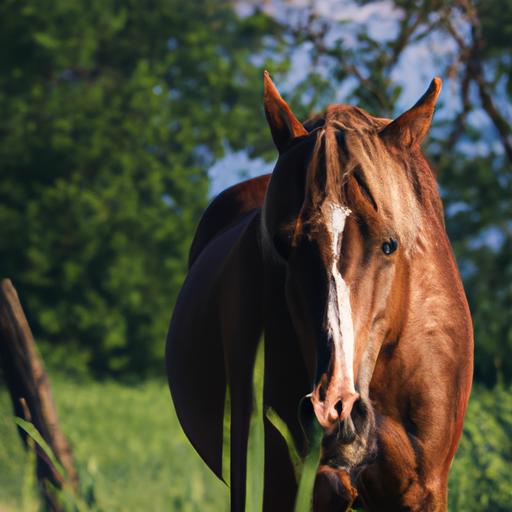Discover the perfect horse breed with the least health problems. Learn about responsible ownership, veterinary care, nutrition, exercise, and preventive measures.
As an aspiring horse owner, you want a four-legged companion that will bring you joy and adventure for years to come. But have you considered the importance of selecting a horse breed with minimal health problems? Just like humans, horses can be prone to certain health issues, and choosing a breed known for its good health can significantly impact your equine partner’s longevity and well-being.
In this comprehensive guide, I will walk you through the process of choosing the perfect horse breed with the least health problems. From understanding the factors to consider when evaluating horse breeds to highlighting top breeds known for their good health, we will explore how genetic research and responsible horse ownership play a crucial role in maintaining your horse’s optimal health.
Why is it important to choose a horse breed with minimal health problems?
Imagine embarking on a thrilling horseback ride through picturesque landscapes, feeling the wind on your face as your equine companion gracefully carries you. Now, picture the heartache and frustration of dealing with recurring health issues, visits to the vet, and the financial strain it can bring. By selecting a horse breed with a reputation for good health, you can minimize the risk of encountering these challenges, allowing you to focus on building a deep bond and enjoying unforgettable moments together.
The purpose of this guide
In this article, I will not only provide valuable insights into horse breeds known for their good health but also delve into genetic research and health screening, shedding light on how these practices contribute to the overall well-being of horses. Additionally, I will emphasize the significance of responsible horse ownership and share essential tips for maintaining your horse’s health throughout its life.
So, if you’re searching for a horse breed that will bring you joy, adventure, and minimal health problems, saddle up and let’s embark on this journey together. By the end of this guide, you’ll be equipped with the knowledge and understanding you need to make an informed decision and find the horse of your dreams. Stay tuned for the next section, where we will explore the factors to consider when evaluating horse breeds.
Factors to Consider When Evaluating Horse Breeds

When it comes to choosing a horse breed with the least health problems, there are several crucial factors that you should consider. By taking these factors into account, you can make an informed decision and find a breed that is more likely to have good overall health. Let’s take a closer look at these factors:
Genetic Predispositions: Unveiling the Blueprint
Just like humans, horses inherit certain genetic traits from their parents. These genetic predispositions can greatly influence a breed’s overall health. For example, certain breeds may be more prone to specific health conditions, such as respiratory issues or musculoskeletal disorders. By researching a breed’s genetic background, you can gain insight into potential health risks and make an informed decision based on your horse’s specific needs.
Temperament: A Window into Well-being
A horse’s temperament can also play a significant role in its overall health. A breed known for having a calm and docile temperament is more likely to experience lower stress levels, reducing the risk of stress-related health problems. On the other hand, high-strung or nervous breeds may be more prone to conditions such as ulcers or colic. Evaluating a breed’s temperament can help you determine if it is a good fit for your lifestyle and minimize the potential for health issues caused by stress.
Common Health Issues: A Preventative Approach
Different horse breeds have varying tendencies when it comes to specific health issues. For instance, some breeds may be more susceptible to hoof problems, while others may have a higher incidence of metabolic disorders. Understanding the common health issues associated with specific breeds can help you take a proactive approach to prevent these issues from arising. By implementing preventive measures and proper care, you can significantly reduce the risk of encountering health problems down the road.
In the next section, we will dive into the top horse breeds known for their good health. By understanding the factors outlined above, you will be better equipped to evaluate different breeds and make an informed decision based on their genetic predispositions, temperament, and potential health issues. Stay tuned for the upcoming section, where we explore these breeds in more detail.
Top Horse Breeds Known for Their Good Health
When it comes to selecting a horse breed with the least health problems, there are several exceptional options that stand out for their robust health and resilience. Let’s explore some of these top horse breeds known for their good health, highlighting their notable characteristics, temperament, and health attributes.
1. American Quarter Horse
The American Quarter Horse is renowned for its versatility and soundness. With a muscular build and a calm temperament, this breed excels in various disciplines, including racing, ranch work, and pleasure riding. These horses are generally known for their strong bones, sturdy hooves, and low susceptibility to genetic disorders.
2. Arabian Horse
The Arabian horse is often regarded as one of the healthiest horse breeds. With their distinctive appearance, refined features, and incredible endurance, they are well-suited for long-distance riding, endurance competitions, and pleasure riding. Arabians are known for their strong immune systems, agility, and overall soundness.
3. Morgan Horse
The Morgan horse is a versatile breed with a rich history. Known for its elegant appearance, intelligence, and friendly disposition, Morgans excel in various disciplines, including driving, riding, and ranch work. These horses are generally hardy, with a low incidence of hereditary health issues, making them an excellent choice for both experienced and novice horse owners.
4. Icelandic Horse
Originating from Iceland, the Icelandic horse is a breed known for its exceptional health and resilience. These horses have a thick double coat that protects them in harsh weather conditions and strong immune systems that make them less prone to diseases. Icelandic horses are renowned for their unique gaits, gentle nature, and versatility in riding and competition.
5. Appaloosa Horse
The Appaloosa horse is not only famous for its striking coat patterns but also for its overall good health. With a strong build, hardy constitution, and calm temperament, Appaloosas excel in various disciplines, including western riding, pleasure riding, and ranch work. They are generally free from major hereditary health issues, making them a reliable choice for horse enthusiasts.
By considering these top horse breeds known for their good health, you can increase the likelihood of finding a companion that will bring you joy and minimize the chances of dealing with significant health problems. Remember, while these breeds have a reputation for good health, individual horses may still require proper care, regular veterinary check-ups, and a healthy lifestyle to maintain their well-being. In the next section, we will explore the significance of genetic research and health screening in horse breeding.
Genetic Research and Health Screening
When it comes to ensuring the overall health and well-being of horses, genetic research and health screening play pivotal roles in breed improvement and reducing health issues. Let’s delve into the significance of these practices and how they contribute to the betterment of horse breeds.
The Significance of Genetic Research in Horse Breeding
Genetic research has revolutionized the world of horse breeding, providing valuable insights into the hereditary factors that contribute to specific health issues. By studying the genetic makeup of different horse breeds, researchers can identify potential genetic predispositions to certain diseases or conditions. This knowledge allows breeders to make informed decisions and take the necessary steps to reduce the occurrence of these health problems in future generations.
Understanding the genetic factors that influence a breed’s health not only helps breeders select suitable mating pairs but also promotes responsible breeding practices that prioritize the overall well-being of the horses. Through careful selection and breeding strategies, breeders can gradually eliminate or reduce the prevalence of certain health issues, ultimately improving the overall health and vitality of the breed.
Health Screening: A Cornerstone of Breed Improvement
Health screening is a critical component of responsible horse breeding and plays a vital role in improving breed health. It involves conducting various tests and examinations to identify potential health concerns in individual horses. These screenings can include genetic testing, radiographs, ultrasounds, blood tests, and thorough physical examinations.
By implementing health screening protocols, breeders can identify horses with potential health issues early on and make informed decisions regarding their breeding suitability. This helps prevent the transmission of genetic diseases or conditions to future generations and ensures that only healthy individuals contribute to the breed’s gene pool.
Furthermore, health screening allows breeders to track and monitor the overall health trends within a breed. By analyzing data from multiple individuals, breeders can identify patterns and trends in the occurrence of specific health issues. This information serves as a valuable tool for breed improvement, guiding breeders in their selection of mating pairs and enabling them to make informed decisions to reduce the prevalence of health problems within the breed.
In the next section, we will explore the responsibilities of responsible horse ownership and how it contributes to maintaining the good health of your equine companion.
Conclusion
In conclusion, when it comes to choosing a horse breed with the least health problems, you hold the reins to a future filled with joy, adventure, and a long-lasting equine companion. By considering the factors that contribute to a breed’s overall health, exploring top breeds known for their good health, understanding the importance of genetic research and health screening, and embracing responsible horse ownership and health maintenance, you can ensure the well-being of your beloved horse.
Remember, the journey towards finding the perfect horse breed starts with you. Take the time to research and educate yourself on different breeds, their genetic predispositions, and common health issues. Seek out reputable breeders or adoption centers that prioritize the health and well-being of their horses. By doing so, you’ll increase your chances of finding a horse with a lower risk of health problems and increase the likelihood of a long and fulfilling partnership.
At Horsemasterypro.com, we are dedicated to providing you with the knowledge and resources you need to make informed decisions about horse ownership. Our team of experts is committed to promoting healthy horse breeding practices and supporting responsible horse ownership. Visit our website for more information, tips, and resources to enhance your journey as a horse owner.
So, whether you’re dreaming of galloping across open fields, competing in equestrian events, or simply enjoying the companionship of a majestic equine friend, choose a horse breed with the least health problems. Take the reins, embrace responsible ownership, and embark on an extraordinary journey with your healthy and happy horse.
Remember, the horse you choose today will be your companion for years to come. Choose wisely, and let the bond between you and your equine partner flourish.
Disclaimer: The information provided in this article is for educational purposes only and should not replace professional veterinary advice. Always consult with a qualified veterinarian for specific health concerns and guidance regarding your horse.


